
Economist at @CGDev. Formerly @the_IDB, @WorldBank, @RANDCorporation, and an usher at my neighborhood movie theater. My views, not my employer's.
How to get URL link on X (Twitter) App


 The number of people arriving at the U.S.’s southwest border has risen sharply since 2020. There are 3 broad approaches to addressing: just enforce the law, induce “development” in sending countries, & improve legal channels for immigration. What does research tell us about each?
The number of people arriving at the U.S.’s southwest border has risen sharply since 2020. There are 3 broad approaches to addressing: just enforce the law, induce “development” in sending countries, & improve legal channels for immigration. What does research tell us about each? 

 We identify interventions that benefit girls that reach at least 10,000 beneficiaries. This isn't scale in every system, obviously, but it helps us focus on what we learn *outside* of small pilots. (I also think we learn from small pilots; we just learn different things.)
We identify interventions that benefit girls that reach at least 10,000 beneficiaries. This isn't scale in every system, obviously, but it helps us focus on what we learn *outside* of small pilots. (I also think we learn from small pilots; we just learn different things.) 
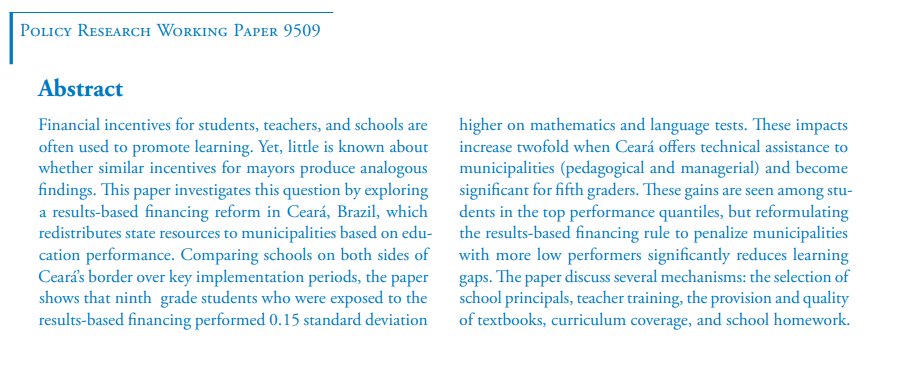
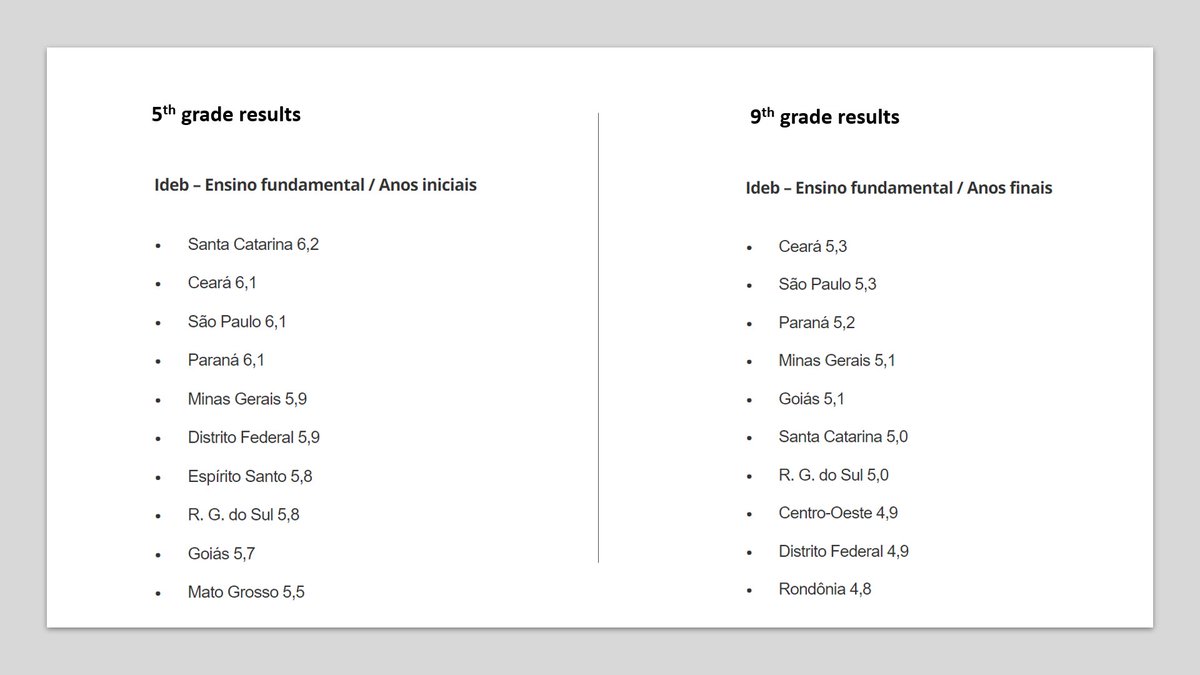
 Yesterday I gave a talk on "The State of Ceará in Brazil is a Role Model for Reducing Learning Poverty" at @ILASColumbia, based on this study (documents1.worldbank.org/curated/en/281…) by @loureiroandre, @cruz_louisee, @IldoLautharte, & me
Yesterday I gave a talk on "The State of Ceará in Brazil is a Role Model for Reducing Learning Poverty" at @ILASColumbia, based on this study (documents1.worldbank.org/curated/en/281…) by @loureiroandre, @cruz_louisee, @IldoLautharte, & me
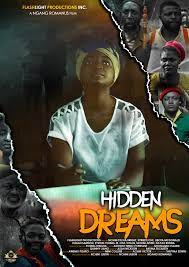


 I'm going to have to say that while I endorse the general message (no to child marriage!), I wasn't sold on the execution.
I'm going to have to say that while I endorse the general message (no to child marriage!), I wasn't sold on the execution.

 @muriel_mafico of @UNICEF mentioned that while most policymakers recognize there is a learning crisis, they underestimate the degree of the crisis in their own countries.
@muriel_mafico of @UNICEF mentioned that while most policymakers recognize there is a learning crisis, they underestimate the degree of the crisis in their own countries.

 The first main finding, strikingly consistent across contexts, is how much worse learning loss is for poorer kids. This is true in high-income countries (like the UK and the US) & middle-income countries (like Bangladesh & Mexico) & low-income countries (like Uganda). 2/12
The first main finding, strikingly consistent across contexts, is how much worse learning loss is for poorer kids. This is true in high-income countries (like the UK and the US) & middle-income countries (like Bangladesh & Mexico) & low-income countries (like Uganda). 2/12 

https://twitter.com/seema_econ/status/1029006712227942400




 Gabrielle Wills: “In 2020 grade 2 students lost between 57% and 70% of a year of learning relative to their pre-pandemic peers. Among a grade 4 sample, learning losses are estimated at between 62% and 81% of a year of learning” in South Africa. sciencedirect.com/science/articl…
Gabrielle Wills: “In 2020 grade 2 students lost between 57% and 70% of a year of learning relative to their pre-pandemic peers. Among a grade 4 sample, learning losses are estimated at between 62% and 81% of a year of learning” in South Africa. sciencedirect.com/science/articl… 




 @Gabriela_LSC: Training school heads on violence prevention in Peru increased reports of violence and reduced transfers from schools. (It didn’t affect test scores, but come on, not everything has to improve test scores. Let’s just keep the kids from getting hurt!) #RISEConf2021
@Gabriela_LSC: Training school heads on violence prevention in Peru increased reports of violence and reduced transfers from schools. (It didn’t affect test scores, but come on, not everything has to improve test scores. Let’s just keep the kids from getting hurt!) #RISEConf2021 



https://twitter.com/dmckenzie001/status/1326165762227265538

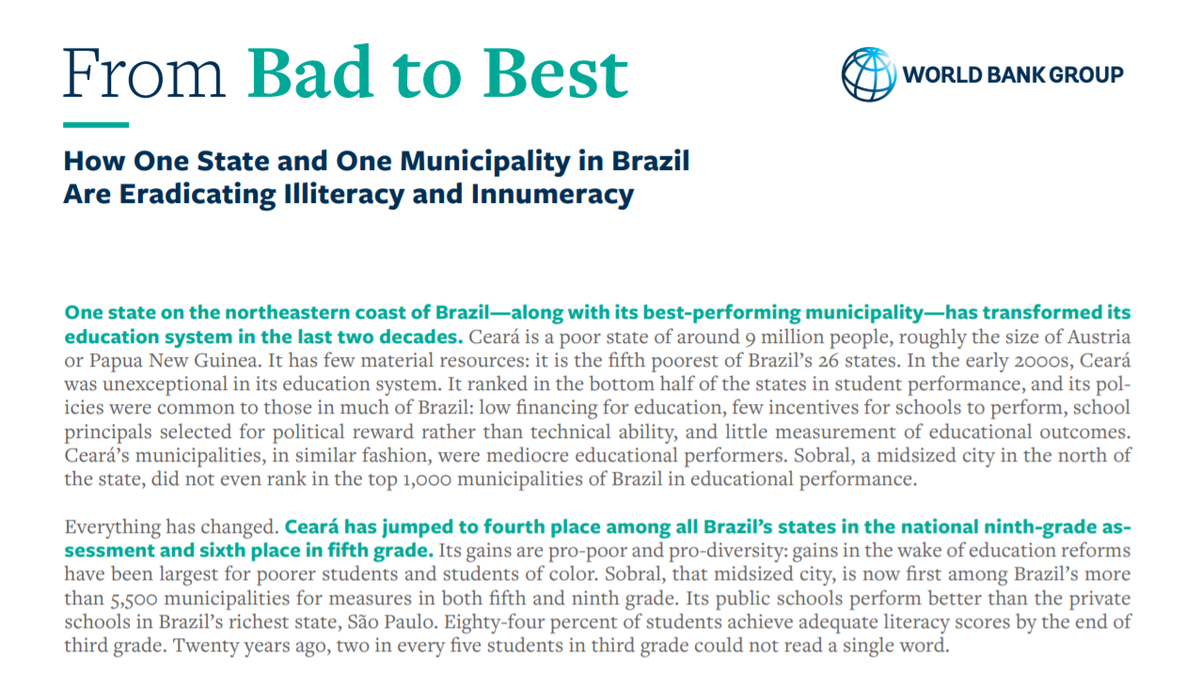
 The state of Ceará & the municipality of Sobral, both in Brazil, have managed a complete turnaround in their basic education systems over two decades. Two new reports extensively document how.
The state of Ceará & the municipality of Sobral, both in Brazil, have managed a complete turnaround in their basic education systems over two decades. Two new reports extensively document how.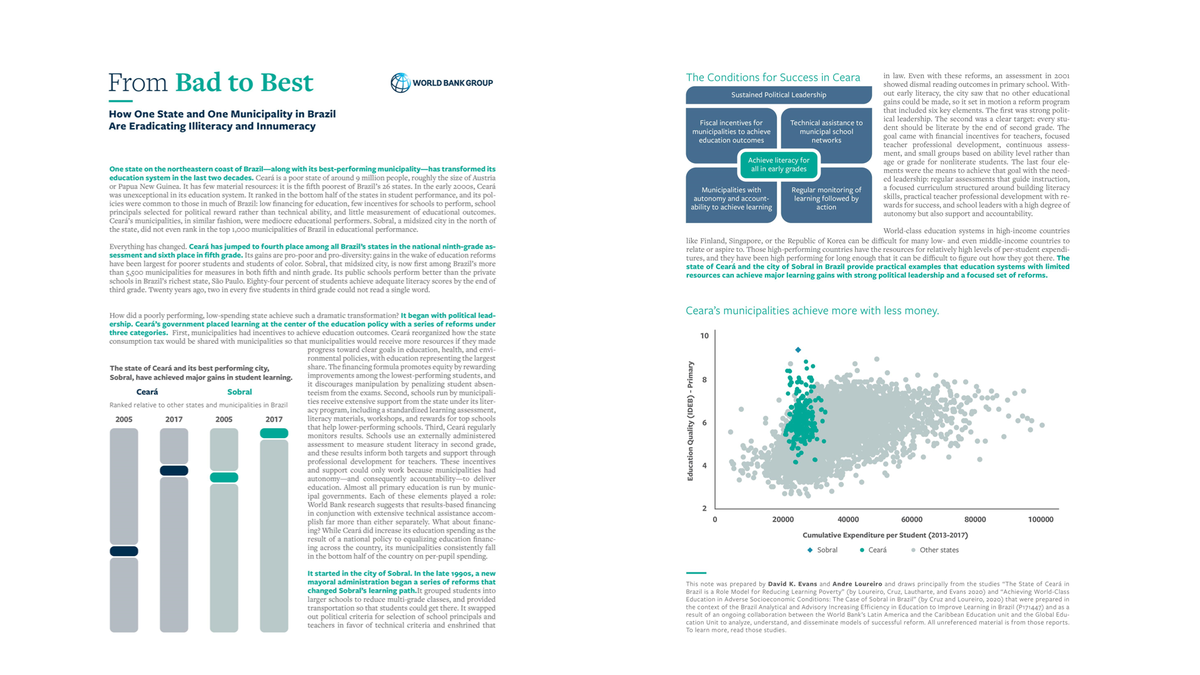
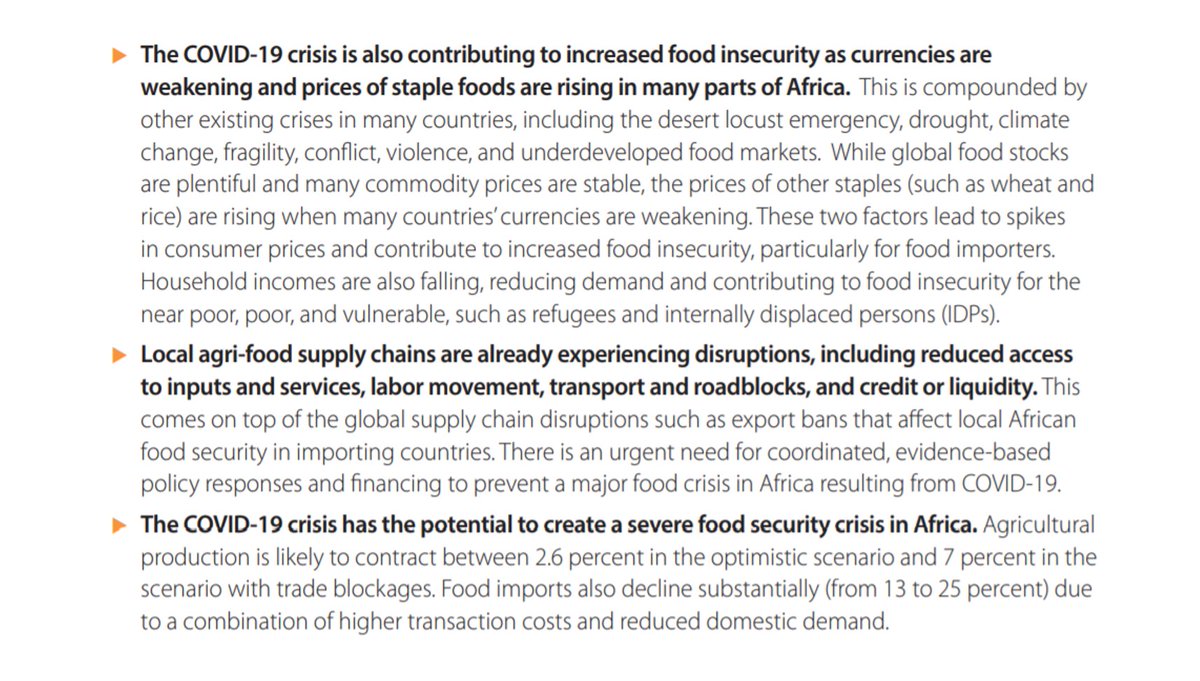
https://twitter.com/DaveEvansPhD/status/1251190800698019846@WorldBankAfrica's publication #AfricaPulse finds prices of staple foods rising and agri-food supply chains rising. openknowledge.worldbank.org/handle/10986/3…

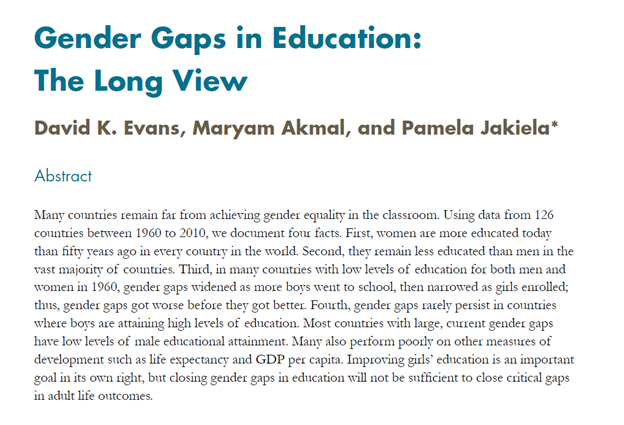
 We document four facts about changes in gender gaps in education over time, using the Barro-Lee data on educational attainment among the population age 15 and above (barrolee.com).
We document four facts about changes in gender gaps in education over time, using the Barro-Lee data on educational attainment among the population age 15 and above (barrolee.com). 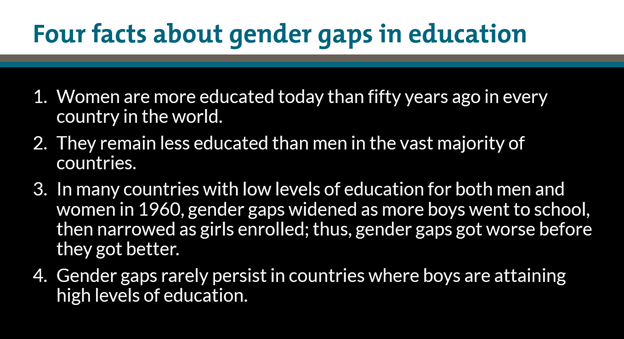

 Good Economics for Hard Times, by Abhijit Banerjee and Esther Duflo (@public_affairs) goodeconomicsforhardtimes.com
Good Economics for Hard Times, by Abhijit Banerjee and Esther Duflo (@public_affairs) goodeconomicsforhardtimes.com
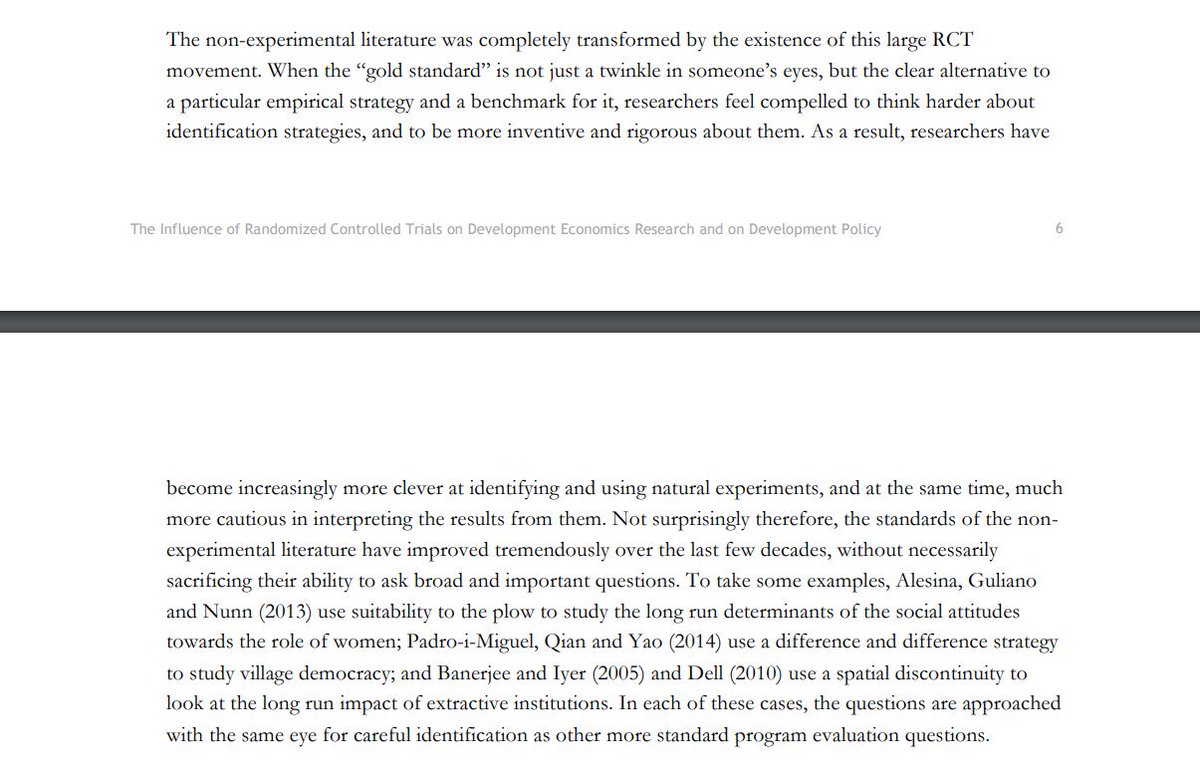
https://twitter.com/DaveEvansPhD/status/11892907955154657281. THE VALUE OF DESCRIPTIVE ANALYSIS. Duflo is best known for her experimental work, but she has paper after paper describing how poor people live, their health, their spending. It's important to understand the problem as well as test solutions.